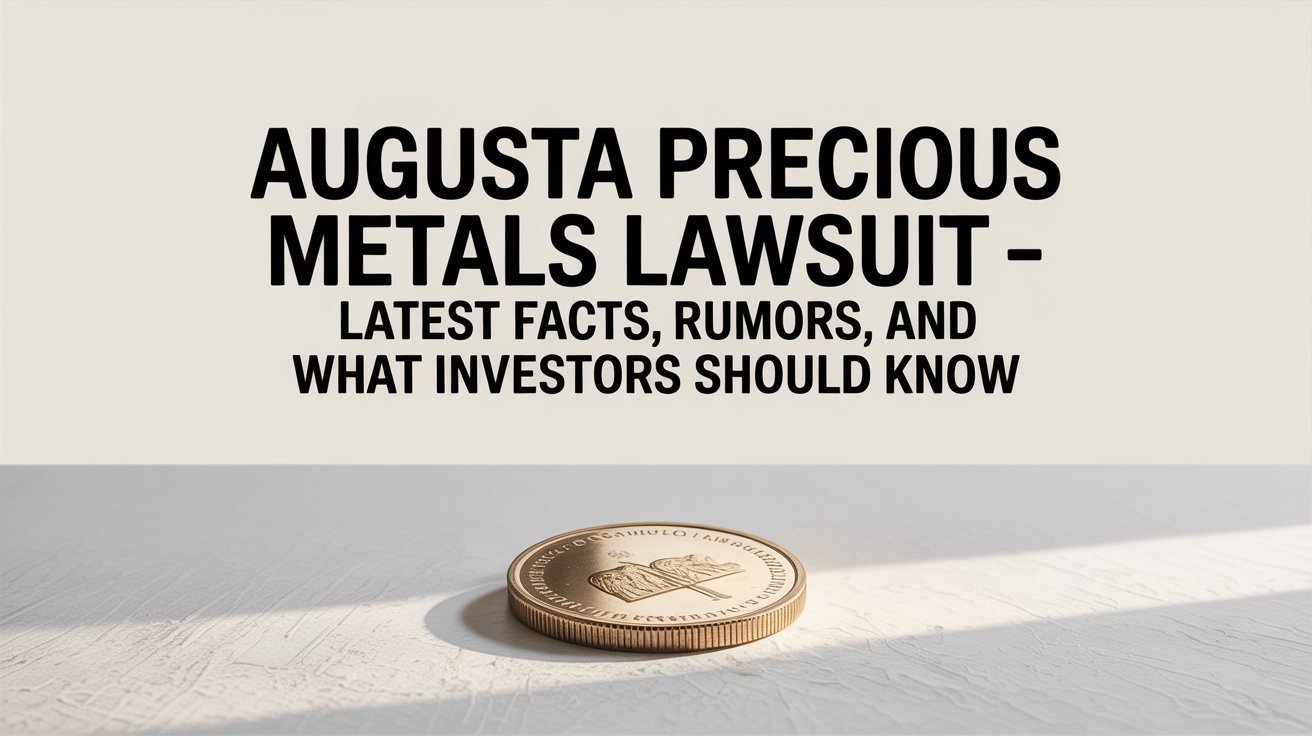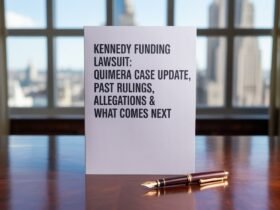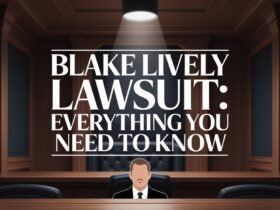In recent years, online searches for the term “Augusta Precious Metals lawsuit” have grown significantly. Many potential investors researching gold IRAs or precious metals retirement accounts stumble across blogs, forums, and marketing websites claiming that the company has been sued, investigated, or involved in fraud. But when you look deeper, the reality is very different from the rumors. This article provides a clear and detailed explanation of the subject, offering clarity for investors who want facts rather than fear.
What Does “Augusta Precious Metals Lawsuit” Mean?
The phrase “Augusta Precious Metals lawsuit” is often used loosely across the internet. Sometimes it is tied to affiliate marketing sites trying to discourage readers from choosing Augusta so that they will click on competing offers. Other times, the phrase shows up in articles that confuse general industry enforcement actions with Augusta itself. In reality, no verified consumer class action lawsuit or government regulatory lawsuit has ever been filed against Augusta Precious Metals as of September 2025.
Instead, most of the buzz originates from competitor disputes and clickbait headlines. One example is a private legal filing made by Orion Precious Metals, which related to trademark and advertising issues. While technically a lawsuit, this was not a fraud case, nor did it involve customer funds or retirement accounts. This distinction is important because many readers assume that any lawsuit means wrongdoing against investors, when in fact some lawsuits are simply business disputes unrelated to client services.
The Latest Verified Legal Status in 2025
As of the latest records, there are no consumer class actions, no government enforcement cases, and no fraud charges against Augusta Precious Metals. The company remains accredited with the Better Business Bureau (BBB) and holds an A+ rating.
The only documented legal dispute on record is Orion Precious Metals, Inc. v. Augusta Precious Metals, which revolves around branding and advertising claims. Such disputes are common in competitive industries where multiple firms use similar marketing strategies. Importantly, this type of lawsuit does not affect customer accounts, funds, or retirement holdings.
Investors researching the phrase “Augusta Precious Metals lawsuit” should separate this Orion case from the false rumors of fraud or customer mistreatment that appear on questionable blogs.
Rumors vs. Facts: Why Misinformation Persists
So why do so many sites claim there is a lawsuit? The answer lies in online marketing. Many blogs in the retirement and investment niche use fear-based headlines to attract traffic. Phrases like “class action” or “lawsuit” grab attention and can scare readers into looking for alternatives.
Some of these articles even go as far as inventing stories about regulatory crackdowns that never happened. Others conflate enforcement actions against completely different precious metals dealers with Augusta. This tactic is misleading and unfair to investors who are simply trying to find safe ways to diversify their retirement portfolios.
The fact is, Augusta Precious Metals has publicly denied any consumer lawsuit or regulatory action, and their BBB record supports that statement. When comparing facts with rumors, it becomes clear that the lawsuit narrative is largely a marketing tool rather than a legal reality.
Regulatory Context: Enforcement in the Precious Metals Industry
To understand why rumors spread, it helps to look at the broader industry. The precious metals and gold IRA sector has faced real regulatory actions in the past—just not against Augusta.
The Commodity Futures Trading Commission (CFTC) and the Federal Trade Commission (FTC) have both brought cases against companies that misled investors about coin values, charged hidden fees, or promoted “semi-numismatic” coins at huge markups. These cases are legitimate and serve as reminders that investors must remain cautious.
However, none of these enforcement actions named Augusta Precious Metals. Unfortunately, online content often blurs the line, making it appear as if Augusta was involved when it was not. For this reason, investors should always check official sources before believing claims of lawsuits.
How to Verify Claims Yourself
If you want to double-check any legal claim about Augusta Precious Metals, here are reliable steps you can take:
- Search Court Dockets — Online platforms such as Trellis or state court websites allow you to verify whether a company is listed in an active lawsuit. Look for exact case numbers and parties named.
- Review BBB and BCA Profiles — The Better Business Bureau and Business Consumer Alliance provide accreditation status, complaint records, and ratings. Augusta’s A+ rating shows no sign of legal or ethical troubles.
- Check Regulatory Press Releases — Agencies like the FTC, SEC, or CFTC publish enforcement actions. If Augusta is not named, then no official action exists.
- Weigh Corporate Statements — Company responses should be considered but balanced with independent sources.
By following these steps, you can quickly confirm whether the phrase “Augusta Precious Metals lawsuit” has any legal basis or is just marketing fluff.
Timeline of Mentions and Online Buzz
- 2023–2024: Enforcement actions targeted other dealers in the industry, creating headlines that sometimes spilled over into Augusta’s search results.
- 2024: Several blogs began pushing “lawsuit” narratives, largely for affiliate marketing purposes.
- 2025: Augusta publicly addressed the rumors, reaffirming that no fraud or consumer lawsuits exist. Around the same time, the Orion advertising dispute surfaced, which added another layer of confusion for readers.
This timeline demonstrates that while the keyword keeps appearing, no customer-focused case has emerged against Augusta itself.
Impact on Investors
For everyday investors, the Orion lawsuit or rumors of a lawsuit have little to no impact. Customer funds, retirement accounts, and gold holdings are not tied to a trademark dispute. What matters more is whether the company delivers transparent fees, secure storage, and ethical practices.
Still, the persistence of these rumors highlights the importance of due diligence. Before investing with any company—whether Augusta or a competitor—you should verify fee structures, read reviews from credible sites, and confirm custodian arrangements. That way, you protect yourself from misleading sales tactics or hidden charges that do exist elsewhere in the industry.
Red Flags to Watch for in Any Gold IRA Company
While Augusta’s reputation is solid, investors should remain aware of general red flags in the industry:
- High-Pressure Sales — Some firms push clients into buying quickly by creating false urgency.
- Undisclosed Markups — Watch for coins or bullion sold at inflated premiums without clear disclosure.
- “Semi-Numismatic” Add-Ons — Certain dealers push collectible coins that do not belong in a retirement account.
- Opaque Custodian Fees — Always ask for a written schedule of custodial, storage, and transaction costs.
These practices have led to real lawsuits and regulatory actions elsewhere. Knowing them helps you avoid companies that may not act in your best interest.
FAQs About the Augusta Precious Metals Lawsuit
Is Augusta Precious Metals currently being sued by customers or regulators?
No. As of September 2025, there are no consumer lawsuits or regulatory enforcement actions against the company.
What is the Orion Precious Metals case about?
It is a trademark and advertising dispute filed by a competitor, not a fraud or customer case.
Does Augusta have complaints?
Like any business, Augusta has received occasional complaints, but its overall ratings with the BBB remain A+, and no pattern of fraud exists.
Sources and Ongoing Monitoring
Because rumors evolve, investors should monitor the following sources for updates:
- Court docket services (Trellis, PACER, state courts).
- BBB and BCA records.
- Regulator press releases (CFTC, FTC, SEC).
- Company announcements (balanced with independent fact-checking).
These sources will help confirm whether new information emerges or if the rumors remain unsubstantiated.
Bottom Line
The phrase “Augusta Precious Metals lawsuit” is more rumor than reality. No verified consumer lawsuit or government enforcement case has ever been filed against Augusta. The only case on record is a competitor’s advertising dispute, which does not impact customer accounts or investments.
Investors should treat online lawsuit headlines with caution, verify claims through court dockets and official agencies, and focus on transparent due diligence. The persistence of these rumors serves as a reminder that in the precious metals industry, facts often matter less to marketers than clicks—but for your retirement savings, the truth should always come first.
Also read more interesting topics at mgtimes.co.uk.







Leave a Reply